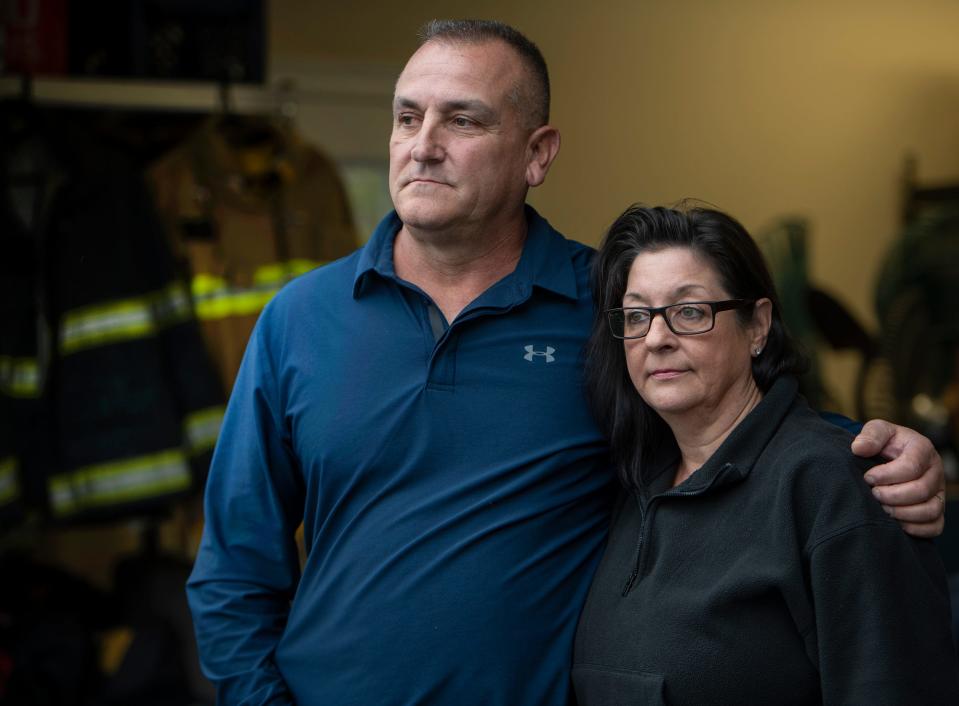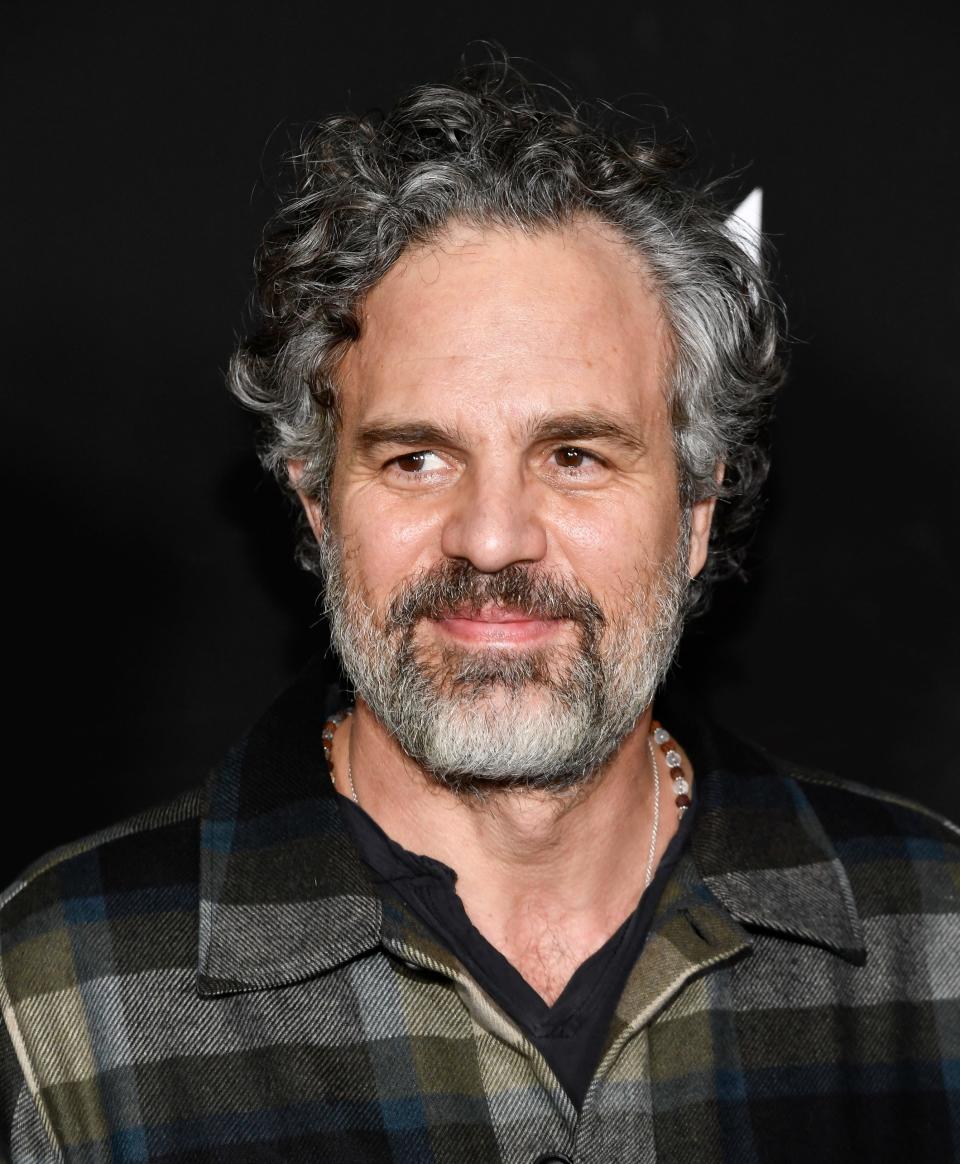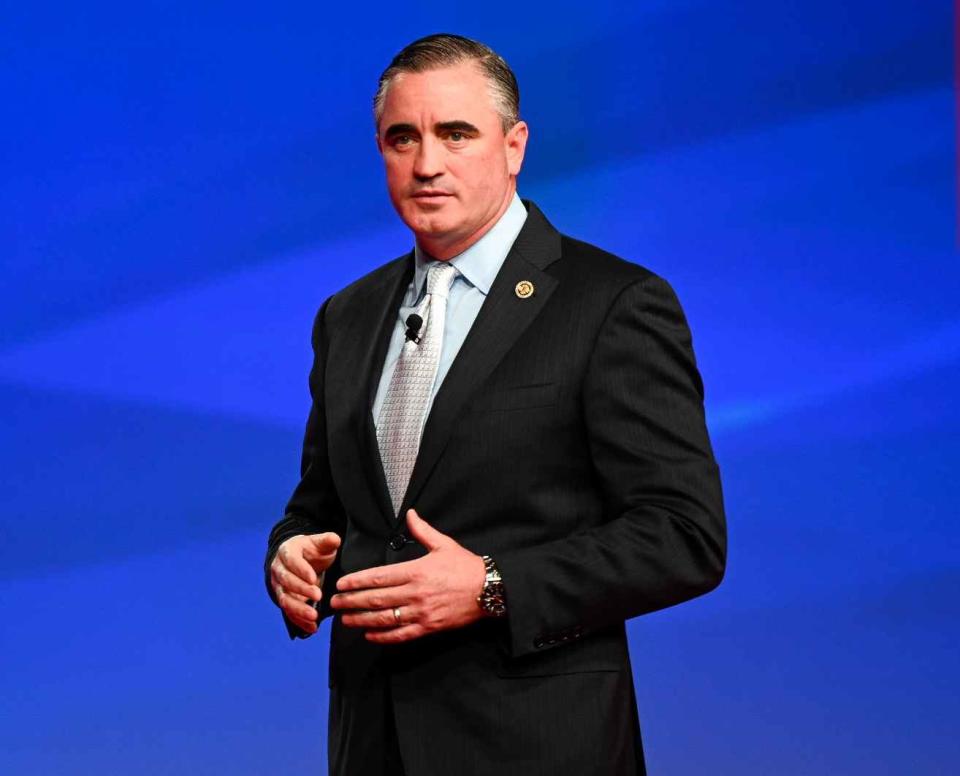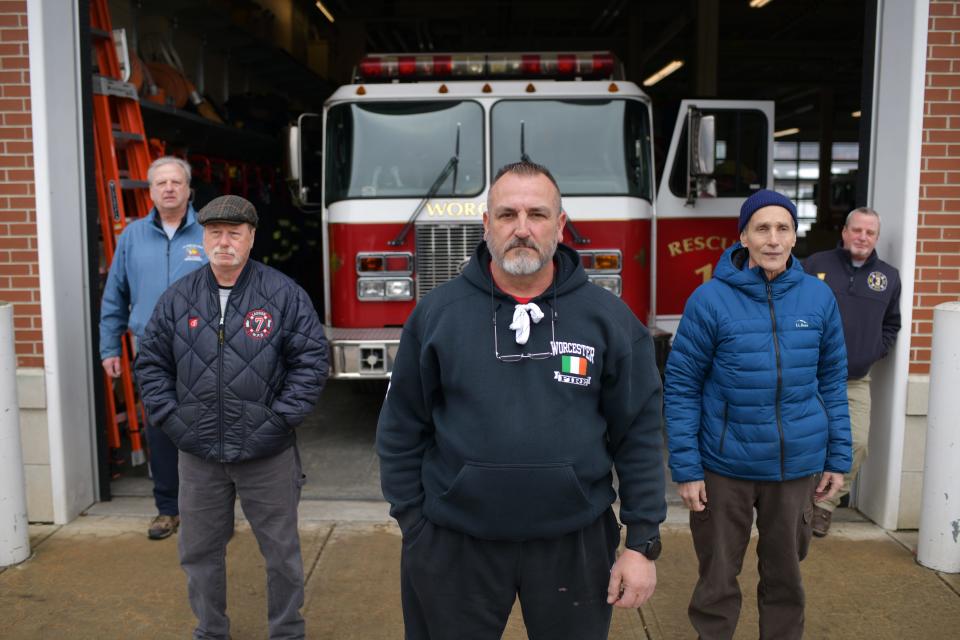'Firefighter’s hero': Diane Cotter featured in PFAS documentary produced by actor Mark Ruffalo
WORCESTER — The efforts of Diane Cotter — the former city resident who fought for years to expose the existence of harmful “forever” chemicals in firefighter turnout gear — are featured prominently in a forthcoming documentary produced by actor Mark Ruffalo.
“Burned: Protecting the Protectors,” a 30-minute film that aims to save the lives of firefighters by spotlighting concerns Cotter uncovered, will premiere this month at a Las Vegas summit of the nation’s largest fire union.
“The very thing that’s supposed to be keeping us safe is costing us our lives,” Ed Kelly, president of the International Association of Fire Fighters, alleges in the film, regarding firefighter gear. “We would not know that were it not for the firefighter’s hero, Diane Cotter.”

Cotter is credited by multiple people in the film as exposing that PFAS, a group of harmful chemicals increasingly linked to cancer, has long been present in the turnout gear firefighters don for safety.
Cotter is not a doctor or, like the person Ruffalo portrayed in a Hollywood movie about PFAS, a lawyer.
Rather, she’s the persistent wife of a retired Worcester firefighter who, as the film chronicles, followed smoke she detected surrounding his cancer diagnosis to a fire that had yet to be reported.
“She was standing alone,” Elijah Yetter-Bowman, the film’s director, said in a recent interview of Cotter, who faced immense opposition in her multiyear investigation into the gear.
As Cotter told the Telegram & Gazette in 2021, she faced stonewalling from giant corporations and ostracism from many in the firefighting community as she raised suspicions and pushed for answers.
“There was a huge emotional labor — a huge amount of resistance she had to face,” said Yetter-Bowman, who provided the T&G an advance copy of the film.
'Personal bravery'
The water supply in Yetter-Bowman's hometown of Wilmington, North Carolina, was polluted with PFAS for decades. The director has been fixated on the emerging environmental crisis for more than five years.
A self-described “health science nerd” who enrolled in premed before deciding to pursue the arts, Yetter-Bowman realized years ago that PFAS — short for polyfluoroalkyl and perfluoroalkyl substances — would be a far bigger hazard than most understood.

The manmade chemicals have been used since the middle of the last century to produce modern conveniences such as fire-resistant foams and nonstick pans.
But the same qualities that were marketed as magical — resistance to heat and water through extremely strong chemical bonds — come at a cost, regulators say, to the environment and human health.
Studies have linked PFAS, often called “forever” chemicals because they persist in the environment and the blood, to many adverse health conditions including cancer.
Massachusetts is one of many states suing companies that produce or use the chemicals, including 3M and DuPont, on allegations that they knowingly polluted drinking water by selling PFAS-laden firefighting foams that leeched into the ground.
The accumulation of PFAS in water supplies, chronicled in Ruffalo’s 2019 film “Dark Waters,” is ringing alarm bells across the country and is being scrutinized by federal regulators.
The chemicals have for years been known to be in firefighting foams. But it was Cotter who, after extensive digging, commissioned a study with a University of Notre Dame nuclear physicist that found “staggering” amounts in turnout gear.
“What Diane did took a lot of personal bravery,” scientist Graham Peaslee says of Cotter in "Burned."
Wins mounting
Peaslee is one of several people — including Rob Bilott, the lawyer Ruffalo portrayed in "Dark Waters" — who helped Cotter when many others, including the International Association of Firefighters, discounted or shunned her.
“I feel bad she had to go through everything she had to go through,” Kelly, the current IAFF president, is quoted as saying in "Burned."

The Wall Street Journal reported in 2020 that Kelly’s predecessor, Harold Schaitberger, was under investigation by the FBI for potential financial improprieties relating to pensions.
“Burned” notes that, under Schaitberger’s tenure, the IAFF — whose cancer summit was funded by chemical and gear companies — contradicted the PFAS concerns Cotter was raising.
Peaslee’s study, which he conducted after Cotter sent him firefighting gear, helped turn the tide, and the IAFF is now partnering with Cotter on advocacy efforts to change industry practices.
Recent wins include federal legislation Cotter has pushed for years that is expected to force a migration away from the use of PFAS in turnout gear, which is also referred to as personal protective equipment.
In December, President Joe Biden signed two laws that address PFAS in the fire services.
The National Defense Authorization Act will phase out military purchases of firefighter protective equipment that contains PFAS and award prizes for development of PFAS-free gear, while the Protecting Firefighters from Adverse Substances (PFAS) Act will result in training guidance on ways to reduce or eliminate exposure to PFAS from firefighting foam and personal protective equipment.
The PFAS Act was co-sponsored by U.S. Sen. Maggie Hassan, D-New Hampshire, one of the many lawmakers across the country whom Cotter, now a Granite State resident, has been lobbying on the topic for years.
In an interview, Cotter told the T&G she is very pleased with the legislation, and thanked several allies in her advocacy for their help, including Westfield City Councilor Kristen Mello and Kathy Crosby-Bell, president of the Last Call Foundation in Boston.
Crosby-Bell — who started Last Call to honor her son, Michael Kennedy, a Boston firefighter who died after equipment failure in 2014 — funded Peaslee’s research on PFAS for Cotter and also supported the documentary.
Cotter said that while recent legislation is a positive sign, much more needs to be done including, she believes, large-scale federal investigations into corporations being sued over PFAS and institutions such as the IAFF that she alleges “colluded” with them to obstruct her scrutiny.
Cotter’s husband, Paul, a nearly 24-year department veteran whose prostate cancer diagnosis knocked him off the job, is one of 15 city firefighters diagnosed with cancer who are suing chemical and gear manufacturers over PFAS in their gear.
Paul’s career and story is featured prominently in “Burned” including photos of clippings from fires he worked published in the T&G.
Documentary to have special screening at Hanover Theatre
The Cotters will travel to Las Vegas later this month for the premiere of “Burned” at an IAFF event in Las Vegas.
“If that’s not full circle, I don’t know what is,” Cotter told the T&G, noting that the very organization that opposed her under Schaitberger is now supporting her under Kelly.

Yetter-Bowman, who uses they/them pronouns, met Diane Cotter while working on a forthcoming feature-length documentary on PFAS. They found her story — and the broader concern about turnout gear — worthy of its own film.
“It didn’t feel appropriate to shoehorn Diane’s story into just that film,” they said, adding that it also became apparent the documentary could serve an important function for firefighters worldwide.
With no date certain for full sets of PFAS-free turnout gear to be available, never mind in wide circulation, it’s vital, Yetter-Bowman said, that firefighters take common-sense steps — such as only wearing it when necessary and stowing it away when not in use — to avoid unnecessary exposure.
Jason Burns, a Fall River firefighter who has watched multiple young colleagues die of cancer, underscored the urgency at a meeting regarding PFAS captured in the film.
Burns relayed how he first heard of Cotter from her desperate pleas on social media raising the alarm of PFAS in gear in all capital letters.
“She said, ‘You’ve got to look at your gear,’” Burns told attendees of a national PFAS conference. “Little did I know — little did we know … that our personal protective equipment was saturated with PFAS.”
Burns noted that, according to the IAFF, cancer has caused 66% of career firefighter line-of-duty deaths from 2002 to 2019.
“I’m being told that people in labs — labs — are not allowed to touch my gear unless they are appropriately protected,” he said, his voice cracking as he recalled how he used to drape his own children in the gear.
“Do you think I would have done that if I had (known that)?” he asked. “My God, no.”
Manufacturers of turnout gear and chemical companies like DuPont and 3M have denied the allegations they are facing in lawsuits regarding turnout gear.
DuPont has set aside $4 billion along with two of its spinoffs to handle future PFAS-related liability, while 3M last month announced it intends to stop producing PFAS by 2025.
In his book on his legal fight regarding PFAS, Bilott wrote that DuPont, as of 1980, knew that PFOA, a type of PFAS, “could permeate all protective materials eventually, so all gloves had to be disposed after use.”
Cotter first suspected chemicals could have played a role in her otherwise healthy husband’s prostate cancer after looking at the worn groin area of his turnout gear.
Bilott is expected, along with several other guests including Peaslee, to attend a special screening of “Burned” at The Hanover Theatre June 11.
The event, proceeds from which will benefit Last Call, is symbolic in many ways for Cotter, whose father, the late city icon “Johnny Dee” DiBenedetto, managed the Loew’s Poli Theatre, as The Hanover used to be known, from 1942 to 1972.
In addition to the screenings in Las Vegas and Worcester, Yetter-Bowman and Ruffalo will be providing the film free of charge to any firehouse that requests it.
Ruffalo remarks to firefighters in the film: “It’s not fair that you are literally encapsulated in these chemicals every single day, every moment you do your job.
“There’s a movement to bring safety to the people who bring us safety — you. And so I would ask you to open your hearts and your minds to what this film is trying to tell you.”
Contact Brad Petrishen at brad.petrishen@telegram.com. Follow him on Twitter @BPetrishenTG
This article originally appeared on Telegram & Gazette: “Firefighter’s hero”: Worcester’s Diane Cotter featured in Mark Ruffalo PFAS documentary

